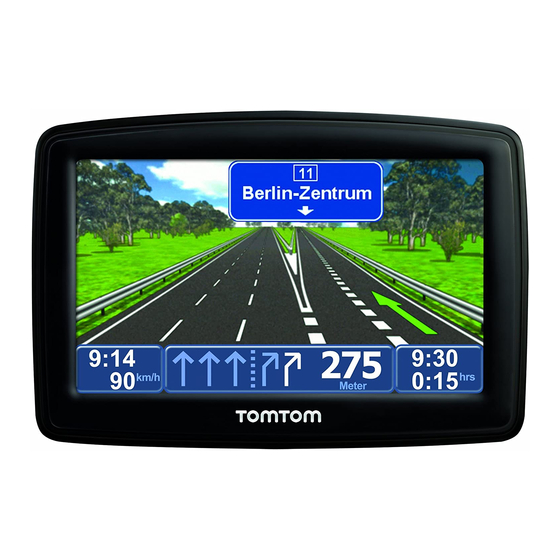and cause injury and/or damage. Do not pierce, open or disassemble the battery. If the
battery leaks and you come into contact with the leaked fluids, rinse thoroughly with water
and seek medical attention immediately. For safety reasons, and to prolong the lifetime of
the battery, charging will not occur at low (below 0 C/32 F) or high (over 45 C/113 F) tem-
peratures.
Temperatures: Standard operation: -0 C (32 F) to +45 C (113 F); short-term storage: -20 C
(-4 F) to + 60 C (140 F); long-term storage: -20 C (-4 F) to +25 C (77 F).
Caution: risk of explosion if battery is replaced with an incorrect type.
Do not remove or attempt to remove the non-user-replaceable battery. If you have a pro-
blem with the battery, please contact TomTom customer support.
THE LITHIUM-ION BATTERY CONTAINED IN THE PRODUCT MUST BE RECYCLED
OR DISPOSED OF PROPERLY ACCORDING TO THE LOCAL LAWS AND REGULA-
TIONS AND ALWAYS SEPARATE FROM HOUSEHOLD WASTE. BY DOING THIS
YOU WILL HELP CONSERVE THE ENVIRONMENT. USE YOUR TOMTOM ONLY
WITH THE SUPPLIED DC POWER LEAD (CAR CHARGER/BATTERY CABLE) AND AC
ADAPTER (HOME CHARGER) FOR BATTERY CHARGING.
Please use this device with the charger provided.
For replacement chargers, go to tomtom.com for information about approved chargers
for your device.
To recycle your TomTom unit please see your local approved TomTom service center.
Do not disassemble or crush, bend or deform, puncture or shred.
Do not modify or remanufacture, attempt to insert foreign objects into the battery,
immerse or expose to water or other liquids, expose to fire, explosion or other hazard.
Only use the battery for a system for which it is specified.
Only use the battery with a charging system that has been qualified with the system per
this standard. Use of an unqualified battery or charger may present a risk of fire, explosion,
leakage or other hazard.
Do not short circuit a battery or allow metallic conductive objects to contact battery termi-
nals.
Replace the battery only with another battery that has been qualified with the system per
this standard, IEEE-Std-1725-200x. Use of an unqualified battery may present a risk of fire,
explosion, leakage or other hazard.
Promptly dispose of used batteries in accordance with local regulations.
Battery usage by children should be supervised.
Avoid dropping the phone or battery. If the phone or battery is dropped, especially on a
hard surface and the user suspects damage, take it to a service center for inspection.
Improper battery use may result in a fire, explosion or other hazard.
For those host devices that utilize a USB port as a charging source, the host device's user
manual shall include a statement that the phone shall only be connected to products that
bear the USB-IF logo or have completed the USB-IF compliance program.
The stated battery life is a maximum possible battery life. The maximum battery life will
only be achieved under specific atmospheric conditions. The estimated maximum battery
life is based on an average usage profile.
For tips on extending the battery life, go to the FAQ listed below for your country:
36

